2023年初中英语情态动词运用分析及巩固练习(含解析)
文档属性
| 名称 | 2023年初中英语情态动词运用分析及巩固练习(含解析) |
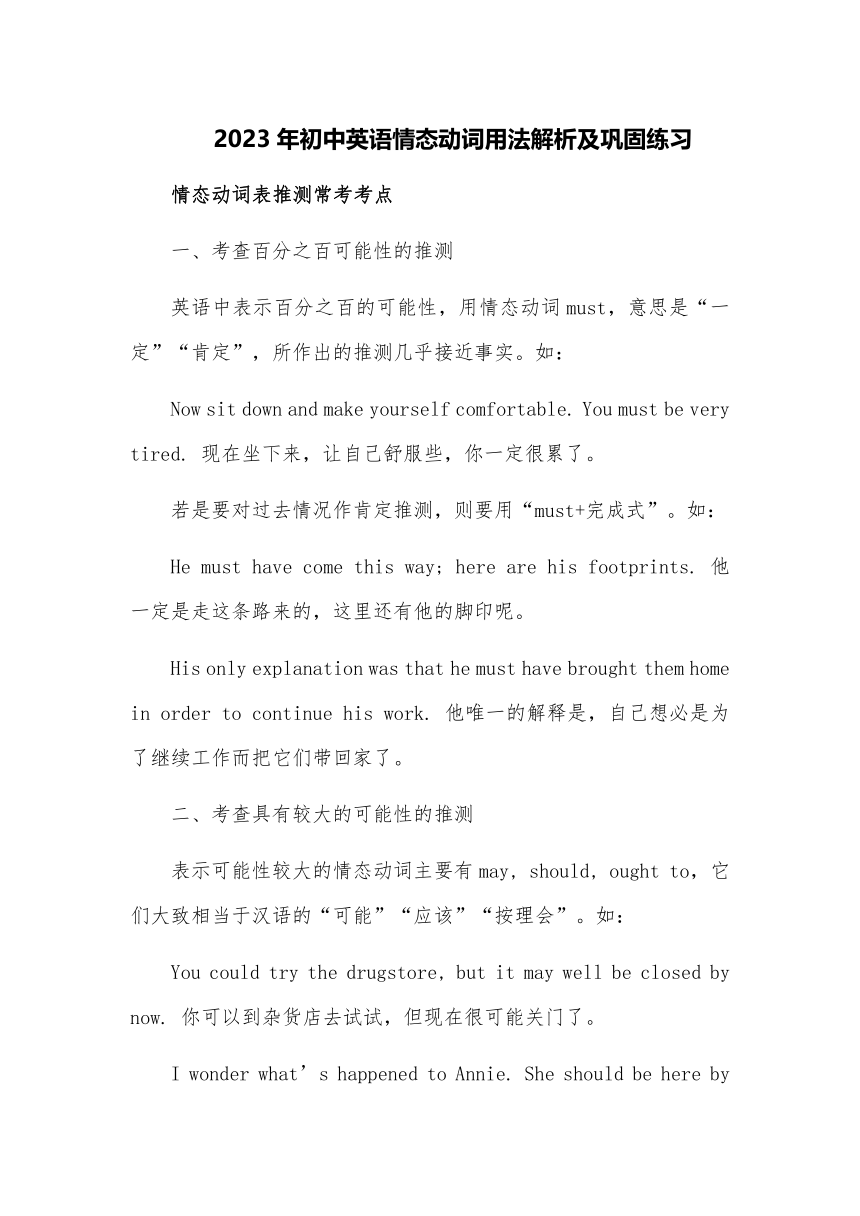
|
|
| 格式 | docx | ||
| 文件大小 | 24.6KB | ||
| 资源类型 | 教案 | ||
| 版本资源 | 通用版 | ||
| 科目 | 英语 | ||
| 更新时间 | 2023-03-28 00:00:00 | ||
图片预览

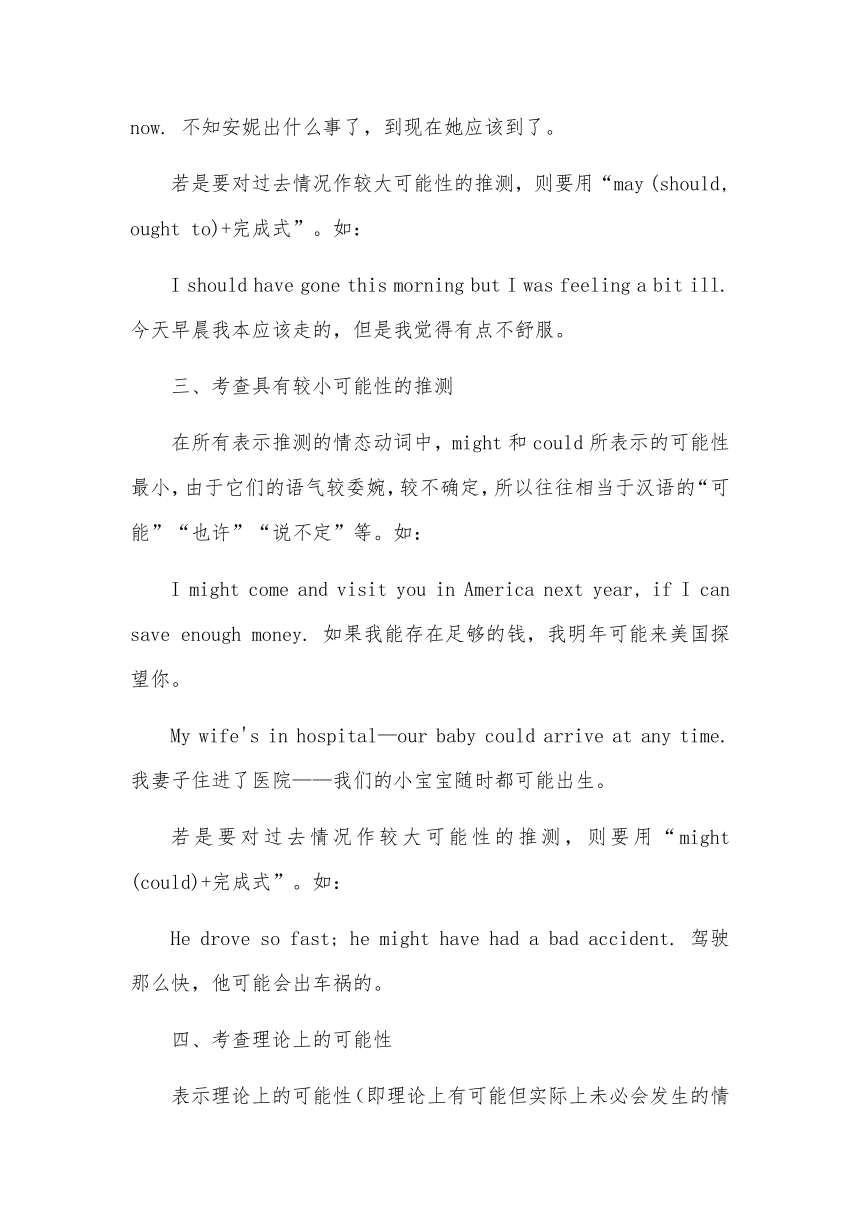
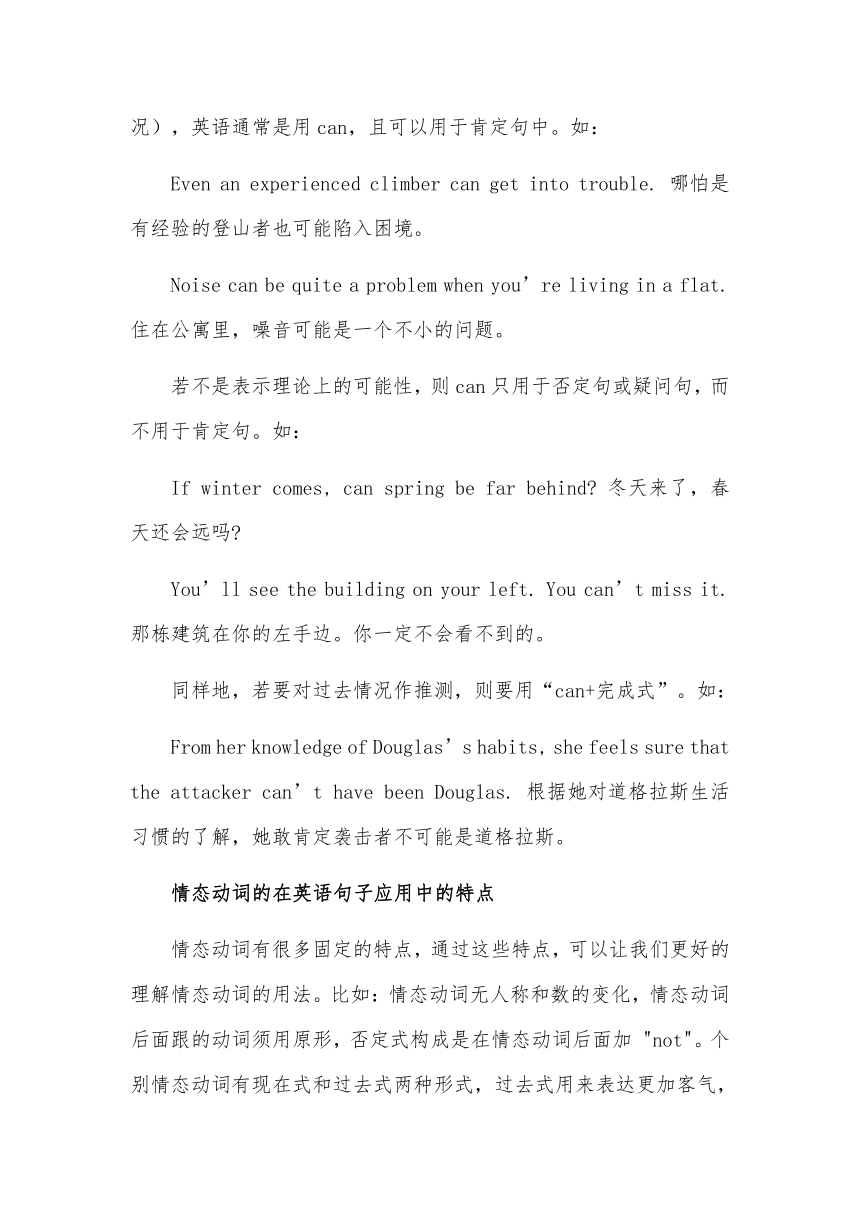
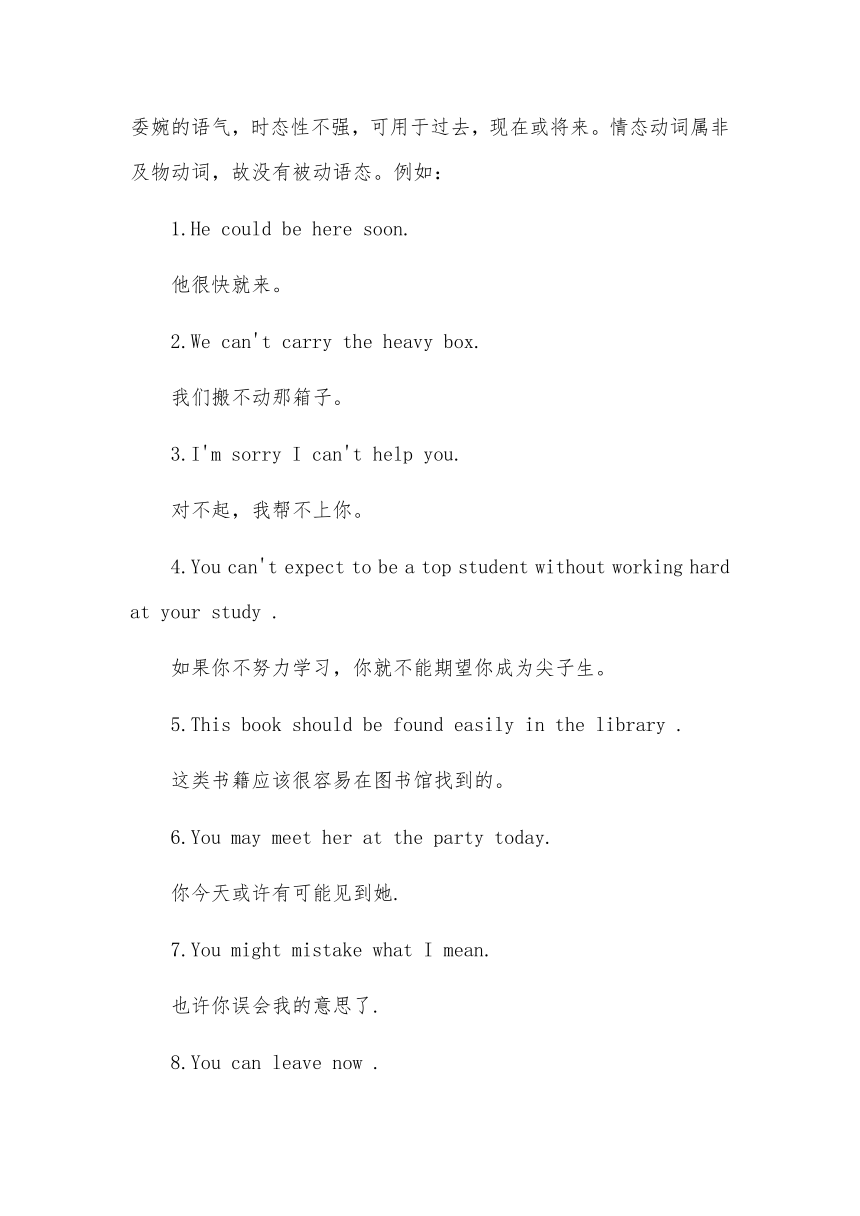
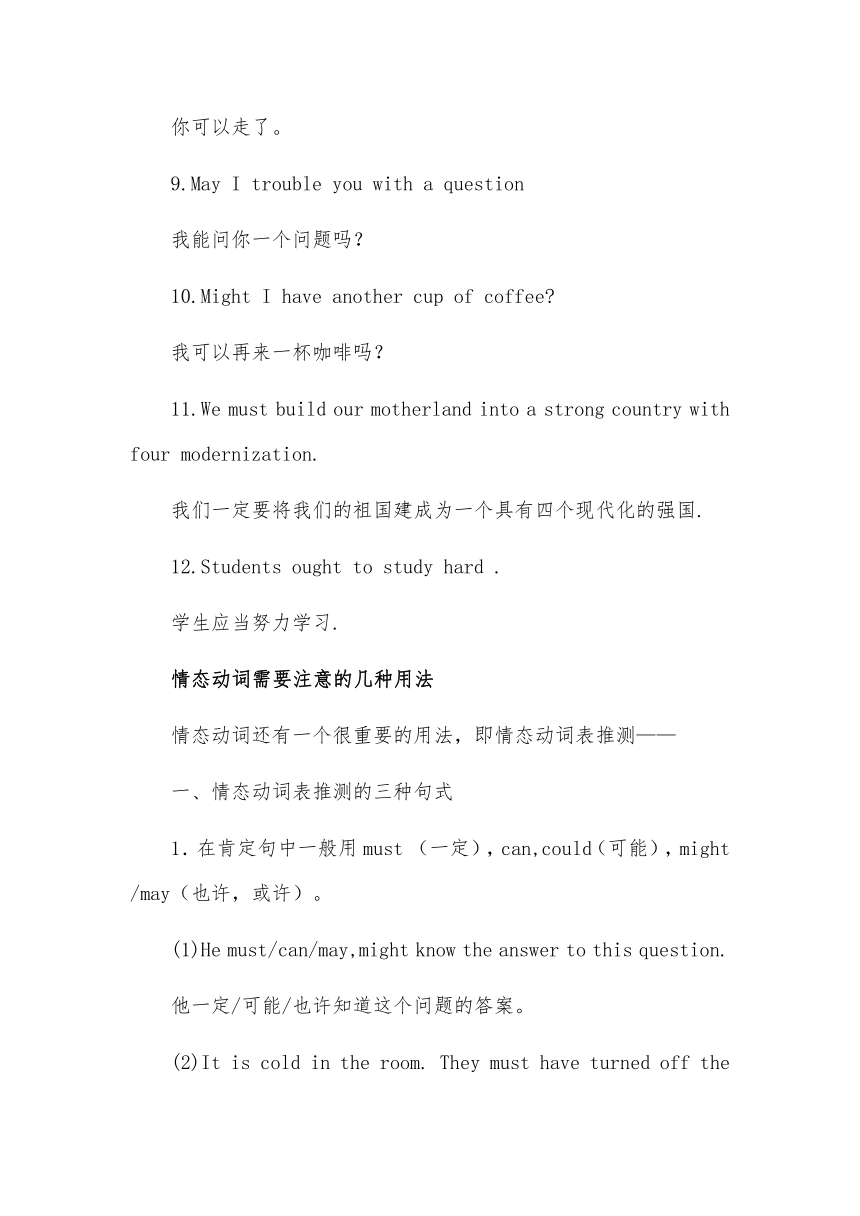
文档简介
2023年初中英语情态动词用法解析及巩固练习
情态动词表推测常考考点
一、考查百分之百可能性的推测
英语中表示百分之百的可能性,用情态动词must,意思是“一定”“肯定”,所作出的推测几乎接近事实。如:
Now sit down and make yourself comfortable. You must be very tired. 现在坐下来,让自己舒服些,你一定很累了。
若是要对过去情况作肯定推测,则要用“must+完成式”。如:
He must have come this way; here are his footprints. 他一定是走这条路来的,这里还有他的脚印呢。
His only explanation was that he must have brought them home in order to continue his work. 他唯一的解释是,自己想必是为了继续工作而把它们带回家了。
二、考查具有较大的可能性的推测
表示可能性较大的情态动词主要有may, should, ought to,它们大致相当于汉语的“可能”“应该”“按理会”。如:
You could try the drugstore, but it may well be closed by now. 你可以到杂货店去试试,但现在很可能关门了。
I wonder what’s happened to Annie. She should be here by now. 不知安妮出什么事了,到现在她应该到了。
若是要对过去情况作较大可能性的推测,则要用“may (should, ought to)+完成式”。如:
I should have gone this morning but I was feeling a bit ill. 今天早晨我本应该走的,但是我觉得有点不舒服。
三、考查具有较小可能性的推测
在所有表示推测的情态动词中,might和could所表示的可能性最小,由于它们的语气较委婉,较不确定,所以往往相当于汉语的“可能”“也许”“说不定”等。如:
I might come and visit you in America next year, if I can save enough money. 如果我能存在足够的钱,我明年可能来美国探望你。
My wife's in hospital—our baby could arrive at any time. 我妻子住进了医院——我们的小宝宝随时都可能出生。
若是要对过去情况作较大可能性的推测,则要用“might (could)+完成式”。如:
He drove so fast; he might have had a bad accident. 驾驶那么快,他可能会出车祸的。
四、考查理论上的可能性
表示理论上的可能性(即理论上有可能但实际上未必会发生的情况),英语通常是用can,且可以用于肯定句中。如:
Even an experienced climber can get into trouble. 哪怕是有经验的登山者也可能陷入困境。
Noise can be quite a problem when you’re living in a flat. 住在公寓里,噪音可能是一个不小的问题。
若不是表示理论上的可能性,则can只用于否定句或疑问句,而不用于肯定句。如:
If winter comes, can spring be far behind 冬天来了,春天还会远吗
You’ll see the building on your left. You can’t miss it. 那栋建筑在你的左手边。你一定不会看不到的。
同样地,若要对过去情况作推测,则要用“can+完成式”。如:
From her knowledge of Douglas’s habits, she feels sure that the attacker can’t have been Douglas. 根据她对道格拉斯生活习惯的了解,她敢肯定袭击者不可能是道格拉斯。
情态动词的在英语句子应用中的特点
情态动词有很多固定的特点,通过这些特点,可以让我们更好的理解情态动词的用法。比如:情态动词无人称和数的变化,情态动词后面跟的动词须用原形,否定式构成是在情态动词后面加 "not"。个别情态动词有现在式和过去式两种形式,过去式用来表达更加客气,委婉的语气,时态性不强,可用于过去,现在或将来。情态动词属非及物动词,故没有被动语态。例如:
1.He could be here soon.
他很快就来。
2.We can't carry the heavy box.
我们搬不动那箱子。
3.I'm sorry I can't help you.
对不起,我帮不上你。
4.You can't expect to be a top student without working hard at your study .
如果你不努力学习,你就不能期望你成为尖子生。
5.This book should be found easily in the library .
这类书籍应该很容易在图书馆找到的。
6.You may meet her at the party today.
你今天或许有可能见到她.
7.You might mistake what I mean.
也许你误会我的意思了.
8.You can leave now .
你可以走了。
9.May I trouble you with a question
我能问你一个问题吗?
10.Might I have another cup of coffee
我可以再来一杯咖啡吗?
11.We must build our motherland into a strong country with four modernization.
我们一定要将我们的祖国建成为一个具有四个现代化的强国.
12.Students ought to study hard .
学生应当努力学习.
情态动词需要注意的几种用法
情态动词还有一个很重要的用法,即情态动词表推测——
一、情态动词表推测的三种句式
1.在肯定句中一般用must (一定),can,could(可能),might /may(也许,或许)。
(1)He must/can/may,might know the answer to this question.
他一定/可能/也许知道这个问题的答案。
(2)It is cold in the room. They must have turned off the heating.
屋里很冷,他们肯定把暖气关了。
2.否定句中用can’t / couldn’t(不可能),may not/might not(可能不)。
(1)It can’t/couldn’t be the headmaster. He has gone to America.
这不可能是校长,他去美国了。
(2)He may not/might not know the scientist.
他也许不认识那位科学家。
3.疑问句中用can/could (能…… )。
(1)Could he have finished the task
他可能把任务完成了吗?
(2)Can he be at home now
他现在能在家吗?
注:以上三种句式中情态动词的语气按程度都是依次递减的。Might,could并非may,can的过去式,而表示语气较为委婉或可能性较小。
二、情态动词表推测的三种时态
1.对将来情况的推测,用“情态动词 + 动词原形”。
(1)She must / may / might / could arrive before 5.
5:00前她一定/可能/也许到。
(2)She must/may/might/could walk miles and miles among the hills without meeting anyone.
她一定/可能/也许会在山里一连走好几英里而遇不到一个人。
2.对现在或一般情况的推测,用“情态动词 + be”,“情态动词 +be doing”或“情态动词 + 动词原形”。
(1)He must / may / might / could be listening to the radio now.
他一定/可能/也许正在听收音机。
(2)He can’t ( couldn’t ) / may ( might ) not be at home at this time.
这个时候他不可能/可能不在家。
(3)Mr. Bush is on time for everything .How can ( could ) he be late for the opening ceremony
布什先生一向准时,这次开幕式他怎么可能迟到呢?
3.对过去情况的推测,用“情态动词 + have +过去分词”。
(1)It must / may / might / could have rained last night .The ground is wet.
地湿了,昨晚肯定/可能/也许下雨了。
(2)The door was locked. He can ( could ) not / may ( might ) not have been at home .
门锁着,他不可能/可能不在家。
(3)Can / Could he have gotten the book?
难道他找到书了吗?
注:情态动词 should /ought to表推测时,意为“想必会,理应……”但与“have +过去分词”连用时,则又可构成虚拟语气意为“本应该做某事却没做”。例如:
(4)It’s seven o’clock. Jack should/ought to be here at any moment.
现在七点钟了,杰克理应随时到达。(推测)
(5)She should / ought to have attended your birthday party,but she had to look after her mother in hospital. (虚拟)
她本该出席你的生日晚会的,可是她得在医院照顾她妈妈。
(6)Tom should not /ought not to have told me your secret,but he meant no harm. (虚拟)
汤姆本不该告诉我你的秘密,可是他并无恶意。
基础语法知识训练·情态动词(附解析)
1. I told Sally how to get here, but perhaps I _______ for her.
A. had to write it out B. must have written it out
C. should have written it out D. ought to write it out
2. —There were already five people in the car but they managed to take me as well.
—It _______ a comfortable journey.
A. can’t be B. shouldn’t be
C. mustn’t have been D. couldn’t have been
3. It’s nearly seven o’clock. Jack _______ be here at any moment.
A. must B. need C. should D. can
4. Johnny, you _______ play with the knife, you _______ hurt yourself.
A. won’t; can’t B. mustn’t; may
C. shouldn’t; must D. can’t; shouldn’t
5. The fire spread through the hotel very quickly but everyone _______ get out.
A. had to B. would C. could D. was able to
6. —When can I come for the photos I need them tomorrow afternoon.
—They _______ be ready by 12:00.
A. can B. should C. might D. need
7. —I stayed at a hotel while in New York.
—Oh, did you You _______ with Barbara.
A. could have stayed B. could stay
C. would stay D. must have stayed
8. —Are you coming to Jeff’s party
—I’m not sure. I _______ go to the concert instead.
A. must B. would C. should D. might
9. I was really anxious about you. You _______ home without a word.
A. mustn’t leave B. shouldn’t have left
C. couldn’t have left D. needn’t leave
10. —Is John coming by train
—He should, but he _______ not. He likes driving his car.
A. must B. can C. need D. may
11. A left-luggage office is a place where bags _______ be left for a short time, especially at a railway station.
A. should B. can C. must D. will
12. I wonder how he _______ that to the teacher.
A. dare to say B. dare saying
C. not dare say D. dared say
13. When he was there, he _______ go to that coffee shop at the corner after work every day.
A. would B. should C. had better D. might
14. It has been announced that candidates _______ remain in their seats until all the papers have been collected.
A. can B. will C. may D. shall
15. How _______ you say that you really understand the whole story if you have covered only a part of the article
A. can B. must C. need D. may
16. —I hear you’ve got a set of valuable Australian coin. _______ I have a look
—Yes, certainly.
A. Do B. May C. Shall D. Should
答案解析
1. C。“ought to / should have+过去分词”表示后悔当初该做但却没做某事。“…也许我本该把详细地址写给她的。”
2. D。“couldn’t have+过去分词”表示对过去情况的推测。既然小汽车上“已有五人”,且是“设法”才把你带去的,如此拥挤,旅途当然“不可能”舒服。
3. C。nearly 暗示“时间不早了”,Jack“按理应当(should)随时(at any moment)”都有可能到达这里。must 语气过强;can 一般不用于肯定推测;need 意义不通,也不用于肯定句。
4. B。mustn’t(不许、千万不)表示禁止。may 表示可能性。句意为“你千万不要玩刀子,可能会弄伤自己的”。
5. D。表示过去具体某次“能够”做成某事只能用 was / were able to 而不用could。
6. B。should 表示按理应当,大概。can 一般不用于肯定推测;用 might 语气太不肯定,顾客可能走掉。
7. A。could have done 表示本可以做但却没有做的事。句意为“你本来可以住在 Barbara 那儿的”;而 must have done 只表示有把握的肯定推测,这与前面具有疑问语气的 Oh, did you 不符。
8. D。语境明显提示“我可能(might)要去听音乐会” 。
9. B。表示轻微的责备,句意为“我真的好担心你啊。你当时本不该不说一声就离开家的”。
10. D。由“他自己喜欢开车”这一习惯推断,“他可能不会(may not)坐火车来”。can not“不可能”,语气太肯定。
11. B。can 表示“可以”。should(应该), must(必须), will(愿意)均不符合语境。
12. D。dare 作行为动词时,一般接 to do,但疑问式或否定式中 to 可以省略,此句有疑问口气。
13. A。would 表示过去的习惯。
14. D。在规章中告诫应考者,在收完所有试卷前“必须”留在教室里。
15. A。can 在疑问句中,表示疑惑、怀疑,根据情况可译作“能、可以”等。
16. B。may 表示请求对方允许,即:“我可以做…吗 ”
情态动词表推测常考考点
一、考查百分之百可能性的推测
英语中表示百分之百的可能性,用情态动词must,意思是“一定”“肯定”,所作出的推测几乎接近事实。如:
Now sit down and make yourself comfortable. You must be very tired. 现在坐下来,让自己舒服些,你一定很累了。
若是要对过去情况作肯定推测,则要用“must+完成式”。如:
He must have come this way; here are his footprints. 他一定是走这条路来的,这里还有他的脚印呢。
His only explanation was that he must have brought them home in order to continue his work. 他唯一的解释是,自己想必是为了继续工作而把它们带回家了。
二、考查具有较大的可能性的推测
表示可能性较大的情态动词主要有may, should, ought to,它们大致相当于汉语的“可能”“应该”“按理会”。如:
You could try the drugstore, but it may well be closed by now. 你可以到杂货店去试试,但现在很可能关门了。
I wonder what’s happened to Annie. She should be here by now. 不知安妮出什么事了,到现在她应该到了。
若是要对过去情况作较大可能性的推测,则要用“may (should, ought to)+完成式”。如:
I should have gone this morning but I was feeling a bit ill. 今天早晨我本应该走的,但是我觉得有点不舒服。
三、考查具有较小可能性的推测
在所有表示推测的情态动词中,might和could所表示的可能性最小,由于它们的语气较委婉,较不确定,所以往往相当于汉语的“可能”“也许”“说不定”等。如:
I might come and visit you in America next year, if I can save enough money. 如果我能存在足够的钱,我明年可能来美国探望你。
My wife's in hospital—our baby could arrive at any time. 我妻子住进了医院——我们的小宝宝随时都可能出生。
若是要对过去情况作较大可能性的推测,则要用“might (could)+完成式”。如:
He drove so fast; he might have had a bad accident. 驾驶那么快,他可能会出车祸的。
四、考查理论上的可能性
表示理论上的可能性(即理论上有可能但实际上未必会发生的情况),英语通常是用can,且可以用于肯定句中。如:
Even an experienced climber can get into trouble. 哪怕是有经验的登山者也可能陷入困境。
Noise can be quite a problem when you’re living in a flat. 住在公寓里,噪音可能是一个不小的问题。
若不是表示理论上的可能性,则can只用于否定句或疑问句,而不用于肯定句。如:
If winter comes, can spring be far behind 冬天来了,春天还会远吗
You’ll see the building on your left. You can’t miss it. 那栋建筑在你的左手边。你一定不会看不到的。
同样地,若要对过去情况作推测,则要用“can+完成式”。如:
From her knowledge of Douglas’s habits, she feels sure that the attacker can’t have been Douglas. 根据她对道格拉斯生活习惯的了解,她敢肯定袭击者不可能是道格拉斯。
情态动词的在英语句子应用中的特点
情态动词有很多固定的特点,通过这些特点,可以让我们更好的理解情态动词的用法。比如:情态动词无人称和数的变化,情态动词后面跟的动词须用原形,否定式构成是在情态动词后面加 "not"。个别情态动词有现在式和过去式两种形式,过去式用来表达更加客气,委婉的语气,时态性不强,可用于过去,现在或将来。情态动词属非及物动词,故没有被动语态。例如:
1.He could be here soon.
他很快就来。
2.We can't carry the heavy box.
我们搬不动那箱子。
3.I'm sorry I can't help you.
对不起,我帮不上你。
4.You can't expect to be a top student without working hard at your study .
如果你不努力学习,你就不能期望你成为尖子生。
5.This book should be found easily in the library .
这类书籍应该很容易在图书馆找到的。
6.You may meet her at the party today.
你今天或许有可能见到她.
7.You might mistake what I mean.
也许你误会我的意思了.
8.You can leave now .
你可以走了。
9.May I trouble you with a question
我能问你一个问题吗?
10.Might I have another cup of coffee
我可以再来一杯咖啡吗?
11.We must build our motherland into a strong country with four modernization.
我们一定要将我们的祖国建成为一个具有四个现代化的强国.
12.Students ought to study hard .
学生应当努力学习.
情态动词需要注意的几种用法
情态动词还有一个很重要的用法,即情态动词表推测——
一、情态动词表推测的三种句式
1.在肯定句中一般用must (一定),can,could(可能),might /may(也许,或许)。
(1)He must/can/may,might know the answer to this question.
他一定/可能/也许知道这个问题的答案。
(2)It is cold in the room. They must have turned off the heating.
屋里很冷,他们肯定把暖气关了。
2.否定句中用can’t / couldn’t(不可能),may not/might not(可能不)。
(1)It can’t/couldn’t be the headmaster. He has gone to America.
这不可能是校长,他去美国了。
(2)He may not/might not know the scientist.
他也许不认识那位科学家。
3.疑问句中用can/could (能…… )。
(1)Could he have finished the task
他可能把任务完成了吗?
(2)Can he be at home now
他现在能在家吗?
注:以上三种句式中情态动词的语气按程度都是依次递减的。Might,could并非may,can的过去式,而表示语气较为委婉或可能性较小。
二、情态动词表推测的三种时态
1.对将来情况的推测,用“情态动词 + 动词原形”。
(1)She must / may / might / could arrive before 5.
5:00前她一定/可能/也许到。
(2)She must/may/might/could walk miles and miles among the hills without meeting anyone.
她一定/可能/也许会在山里一连走好几英里而遇不到一个人。
2.对现在或一般情况的推测,用“情态动词 + be”,“情态动词 +be doing”或“情态动词 + 动词原形”。
(1)He must / may / might / could be listening to the radio now.
他一定/可能/也许正在听收音机。
(2)He can’t ( couldn’t ) / may ( might ) not be at home at this time.
这个时候他不可能/可能不在家。
(3)Mr. Bush is on time for everything .How can ( could ) he be late for the opening ceremony
布什先生一向准时,这次开幕式他怎么可能迟到呢?
3.对过去情况的推测,用“情态动词 + have +过去分词”。
(1)It must / may / might / could have rained last night .The ground is wet.
地湿了,昨晚肯定/可能/也许下雨了。
(2)The door was locked. He can ( could ) not / may ( might ) not have been at home .
门锁着,他不可能/可能不在家。
(3)Can / Could he have gotten the book?
难道他找到书了吗?
注:情态动词 should /ought to表推测时,意为“想必会,理应……”但与“have +过去分词”连用时,则又可构成虚拟语气意为“本应该做某事却没做”。例如:
(4)It’s seven o’clock. Jack should/ought to be here at any moment.
现在七点钟了,杰克理应随时到达。(推测)
(5)She should / ought to have attended your birthday party,but she had to look after her mother in hospital. (虚拟)
她本该出席你的生日晚会的,可是她得在医院照顾她妈妈。
(6)Tom should not /ought not to have told me your secret,but he meant no harm. (虚拟)
汤姆本不该告诉我你的秘密,可是他并无恶意。
基础语法知识训练·情态动词(附解析)
1. I told Sally how to get here, but perhaps I _______ for her.
A. had to write it out B. must have written it out
C. should have written it out D. ought to write it out
2. —There were already five people in the car but they managed to take me as well.
—It _______ a comfortable journey.
A. can’t be B. shouldn’t be
C. mustn’t have been D. couldn’t have been
3. It’s nearly seven o’clock. Jack _______ be here at any moment.
A. must B. need C. should D. can
4. Johnny, you _______ play with the knife, you _______ hurt yourself.
A. won’t; can’t B. mustn’t; may
C. shouldn’t; must D. can’t; shouldn’t
5. The fire spread through the hotel very quickly but everyone _______ get out.
A. had to B. would C. could D. was able to
6. —When can I come for the photos I need them tomorrow afternoon.
—They _______ be ready by 12:00.
A. can B. should C. might D. need
7. —I stayed at a hotel while in New York.
—Oh, did you You _______ with Barbara.
A. could have stayed B. could stay
C. would stay D. must have stayed
8. —Are you coming to Jeff’s party
—I’m not sure. I _______ go to the concert instead.
A. must B. would C. should D. might
9. I was really anxious about you. You _______ home without a word.
A. mustn’t leave B. shouldn’t have left
C. couldn’t have left D. needn’t leave
10. —Is John coming by train
—He should, but he _______ not. He likes driving his car.
A. must B. can C. need D. may
11. A left-luggage office is a place where bags _______ be left for a short time, especially at a railway station.
A. should B. can C. must D. will
12. I wonder how he _______ that to the teacher.
A. dare to say B. dare saying
C. not dare say D. dared say
13. When he was there, he _______ go to that coffee shop at the corner after work every day.
A. would B. should C. had better D. might
14. It has been announced that candidates _______ remain in their seats until all the papers have been collected.
A. can B. will C. may D. shall
15. How _______ you say that you really understand the whole story if you have covered only a part of the article
A. can B. must C. need D. may
16. —I hear you’ve got a set of valuable Australian coin. _______ I have a look
—Yes, certainly.
A. Do B. May C. Shall D. Should
答案解析
1. C。“ought to / should have+过去分词”表示后悔当初该做但却没做某事。“…也许我本该把详细地址写给她的。”
2. D。“couldn’t have+过去分词”表示对过去情况的推测。既然小汽车上“已有五人”,且是“设法”才把你带去的,如此拥挤,旅途当然“不可能”舒服。
3. C。nearly 暗示“时间不早了”,Jack“按理应当(should)随时(at any moment)”都有可能到达这里。must 语气过强;can 一般不用于肯定推测;need 意义不通,也不用于肯定句。
4. B。mustn’t(不许、千万不)表示禁止。may 表示可能性。句意为“你千万不要玩刀子,可能会弄伤自己的”。
5. D。表示过去具体某次“能够”做成某事只能用 was / were able to 而不用could。
6. B。should 表示按理应当,大概。can 一般不用于肯定推测;用 might 语气太不肯定,顾客可能走掉。
7. A。could have done 表示本可以做但却没有做的事。句意为“你本来可以住在 Barbara 那儿的”;而 must have done 只表示有把握的肯定推测,这与前面具有疑问语气的 Oh, did you 不符。
8. D。语境明显提示“我可能(might)要去听音乐会” 。
9. B。表示轻微的责备,句意为“我真的好担心你啊。你当时本不该不说一声就离开家的”。
10. D。由“他自己喜欢开车”这一习惯推断,“他可能不会(may not)坐火车来”。can not“不可能”,语气太肯定。
11. B。can 表示“可以”。should(应该), must(必须), will(愿意)均不符合语境。
12. D。dare 作行为动词时,一般接 to do,但疑问式或否定式中 to 可以省略,此句有疑问口气。
13. A。would 表示过去的习惯。
14. D。在规章中告诫应考者,在收完所有试卷前“必须”留在教室里。
15. A。can 在疑问句中,表示疑惑、怀疑,根据情况可译作“能、可以”等。
16. B。may 表示请求对方允许,即:“我可以做…吗 ”
同课章节目录
- 词法
- 名词
- 动词和动词短语
- 动词语态
- 动词时态
- 助动词和情态动词
- 非谓语动词
- 冠词
- 代词
- 数词和量词
- 形容词副词及其比较等级
- 介词和介词短语
- 连词和感叹词
- 构词法
- 相似、相近词比较
- 句法
- 陈述句
- 一般疑问句和否定疑问句
- 特殊疑问句及选择疑问句
- 反意疑问句
- 存在句(There be句型)
- 宾语从句
- 定语从句
- 状语从句
- 主谓一致问题
- 简单句
- 并列句
- 复合句
- 主谓一致
- 主、表语从句
- 名词性从句
- 直接引语和间接引语
- 虚拟语气
- 感叹句
- 强调句
- 倒装句
- 祈使句
- 句子的成分
- 句子的分类
- 题型专区
- 单项选择部分
- 易错题
- 完形填空
- 阅读理解
- 词汇练习
- 听说训练
- 句型转换
- 补全对话
- 短文改错
- 翻译
- 书面表达
- 任务型阅读
- 语法填空
- 其他资料
